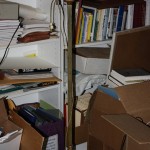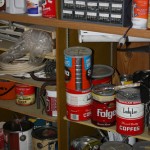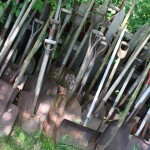After my parents died, my siblings and I were faced with the task of sorting through the detritus of their lives. After their eighty-plus years–more than fifty spent in the same house–this amounted to a stash that could be measured only in units commonly known as “dumpsters.” Typical of our discoveries were:
- An three-foot bureau drawer full of unused candles,
- A bushel of rubber stamp blanks, and
- Hundreds of oleomargarine tubs, carefully washed, stacked, and secured in plastic bags.
These findings filled me with dread, as they reminded me of the contents of my own basement. Was I wading through my own legacy foreshadowed? Is hoarding genetic?
Immediately I began assembling excuses. One basic goal as a homeowner is to conduct routine maintenance without having to go to the hardware store for tools and materials. You can’t do that without a healthy inventory of stuff that might eventually come in handy for repairs.
And of course, even things that I no longer need could be of value to others. Those cane-backed chairs, for example. How can I in good conscience send them to the landfill when with a few hours’ worth of skilled attention, they could be returned to full use in someone else’s dining room?
In the same way, I’m temporarily holding some things until their potential reveals itself.
And let’s not forget, a good third of the contents of my basement belongs to my grown children, who use the space shamelessly as a free storage facility.
Sure, I’ve amassed a wee bit of useless junk. But I have no candles, rubber stamp blanks, or margarine containers. And I’m no Hippie Tom–now there’s a hoarder’s hoarder.
I’m just a guy who’s his parents’ son, and how can you blame me for honoring their memory as I see fit?
What’s your status–hoarder? Collector? Waste management expert?



